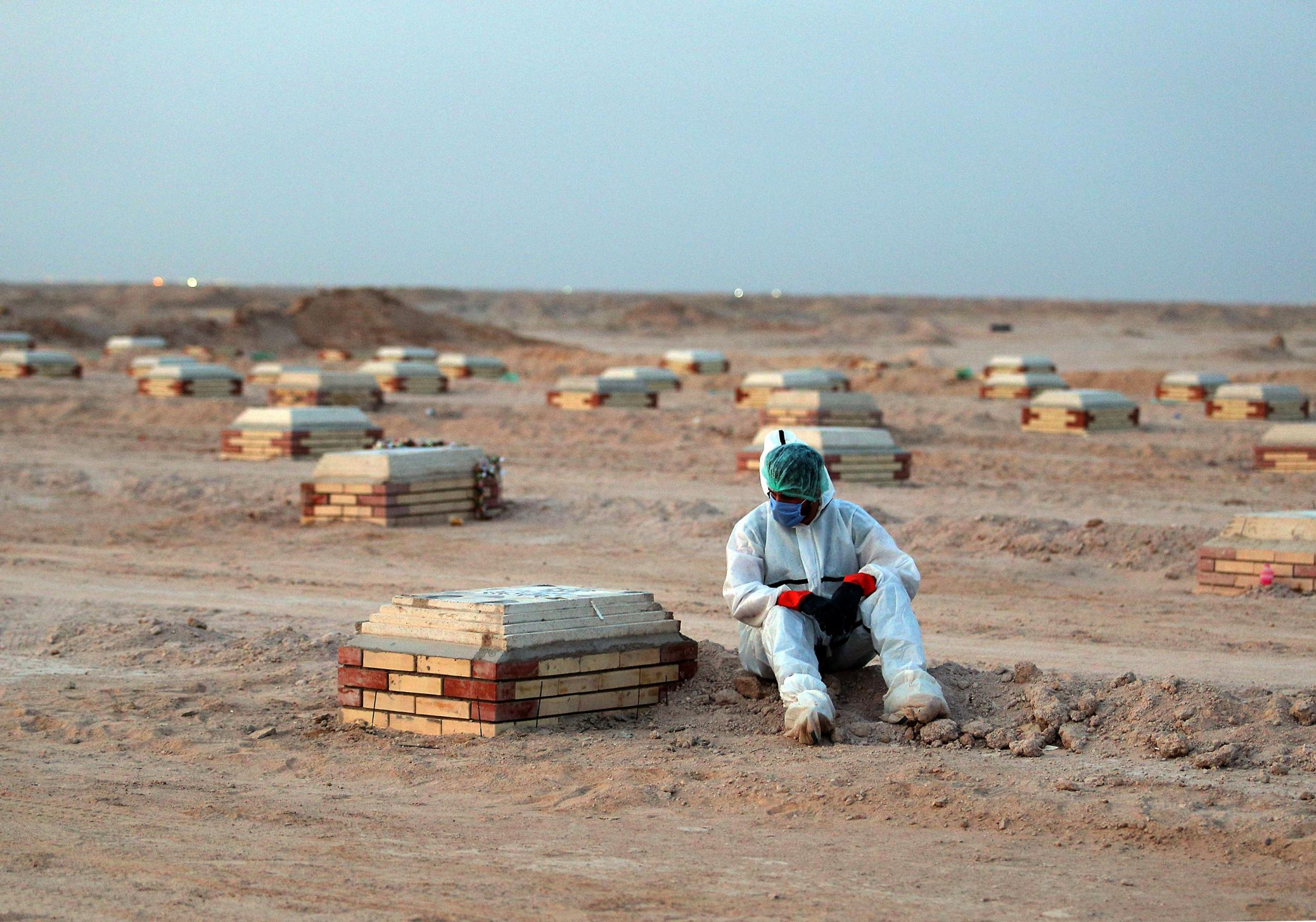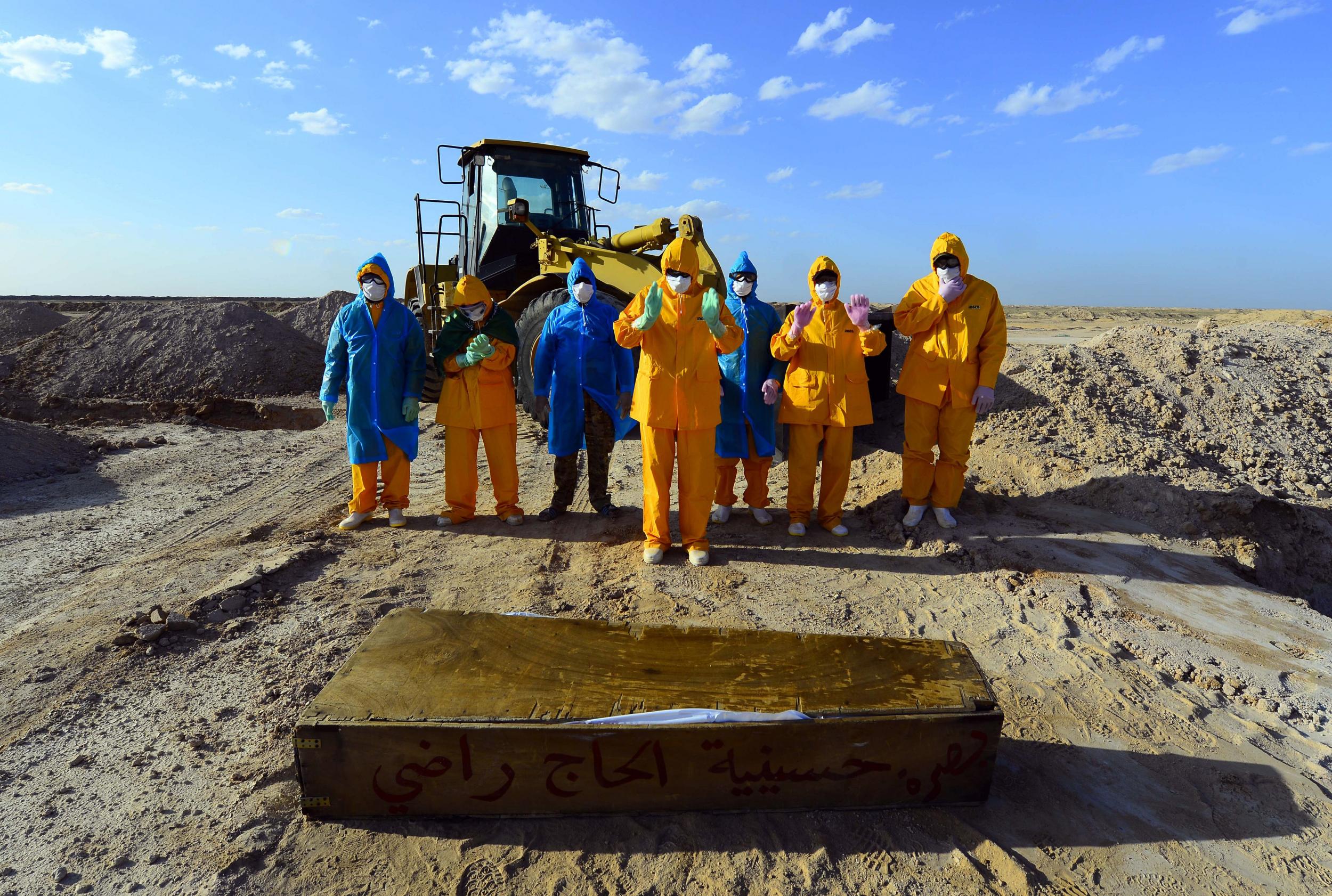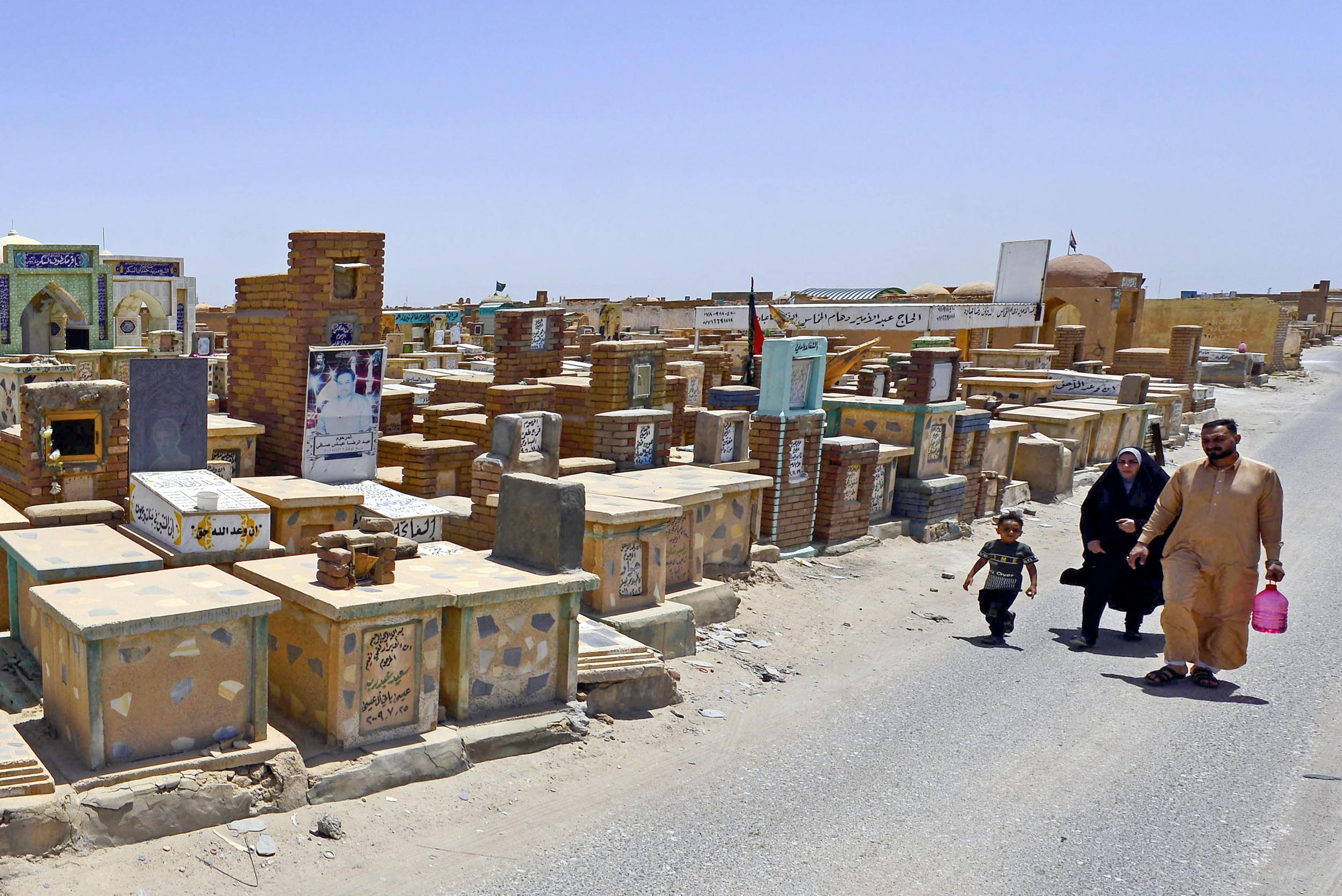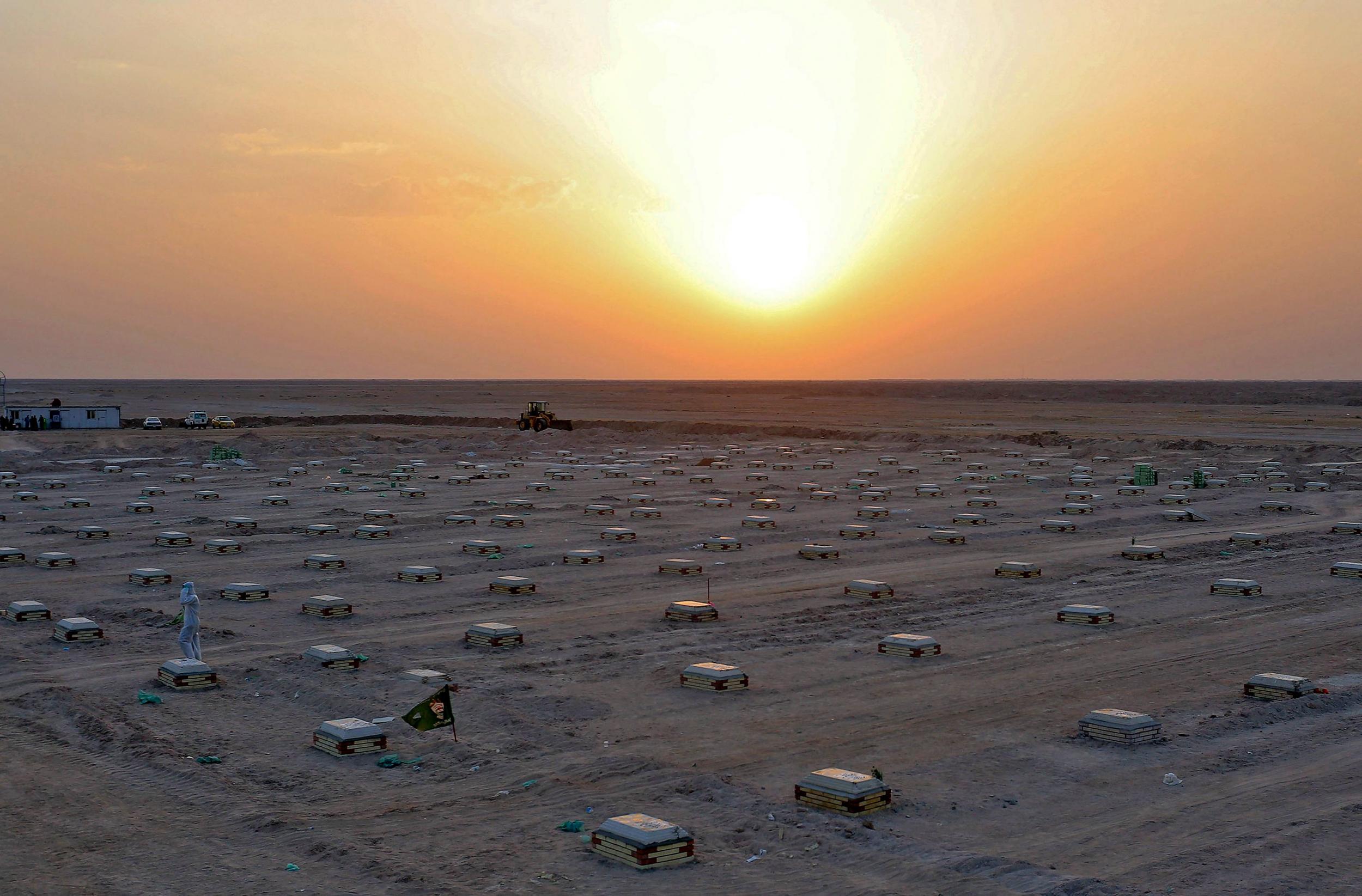'We cannot even touch her body': The story of the 'corona cemetery' in Iraq
Coronavirus has severely affected how Iraqis mourn the dead. No longer are they allowed to perform the Islamic rights that normally allow for grieving, and many are being buried in a single cemetery called the New Valley of Peace, or ‘The corona cemetery’, writes Alissa J Rubin

Your support helps us to tell the story
From reproductive rights to climate change to Big Tech, The Independent is on the ground when the story is developing. Whether it's investigating the financials of Elon Musk's pro-Trump PAC or producing our latest documentary, 'The A Word', which shines a light on the American women fighting for reproductive rights, we know how important it is to parse out the facts from the messaging.
At such a critical moment in US history, we need reporters on the ground. Your donation allows us to keep sending journalists to speak to both sides of the story.
The Independent is trusted by Americans across the entire political spectrum. And unlike many other quality news outlets, we choose not to lock Americans out of our reporting and analysis with paywalls. We believe quality journalism should be available to everyone, paid for by those who can afford it.
Your support makes all the difference.There are no signs to signal the way to the New Valley of Peace, or, as the Iraqis call it, the “Corona cemetery”. But it’s not hard to find: just follow the cars. It’s the only place they are headed on the rough desert road.
Ground was broken on this cemetery in southern Iraq four months ago, and already there are more than 3,200 graves. The backhoes work every night to make new furrows in the sandy soil.
“We are waiting for our mother,” says Ali Radhi, 49, from Nasiriyah, as he stands by his car at the cemetery’s gate in the blazing summer sun, when mid-afternoon temperatures hit 46C. “She died two days ago, but now with corona, we cannot bring her. We have to wait for the ambulance to carry her.”
“There are some rituals we should be doing, but with corona we cannot even touch her body and we did not hold a funeral,” he adds softly, staring up the road as if willing the ambulance carrying his mother’s body to appear on the horizon.
In Islam, burial should be done quickly, if possible within 24 hours of death. The body should be ritually cleansed by professional washers, but the family can be present — men at the washing of a male relative, women of a female one.
In pre-Covid times, Shia Muslims, no matter where they were from in Iraq, would then carry the coffin on their shoulders around the Imam Ali shrine in the pilgrim city of Najaf and pray over the body outside the shrine’s doors. Then they would take the coffin to the Wadi-Al-Salam cemetery, one of the largest and oldest in the world, for burial.
Sunnis would hold their funerals close to home and then take the body to a nearby graveyard, where, as in Shiism, the gravediggers would lift the deceased’s white-shrouded body from the coffin and lay it in the earth, with the head facing Mecca.
For Radhi and the other people whose loved ones have been buried at the new Wadi-Al-Salam cemetery, all these essential rituals must be forgone, and it feels like a betrayal. They failed to do the last good thing possible for someone they loved: to send them in good order to the next world.

“They are burying their relative not in the usual way, and this makes them very sad,” says Tawfik Mahdi, a cleric from Najaf, who is on hand to try to comfort families. “Our role is to reduce their grief and say, ‘Don’t worry, this pandemic happened and you cannot be close to them like you were before, but we will pray for you.’”
The story of how the cemetery came into existence starts when the first coronavirus patients began to die in March in Baghdad.
Religious and health authorities were unprepared for the sense of stigma that having the disease carried, as well as the fear that touching the body would risk contagion. Cemeteries refused to take those who had died of Covid-19 because people whose relatives had not died of the virus felt it was a stigma to be buried next to someone who had.
While scientists have not established how long the virus survives in a person who has died of it, they believe it might linger for as much as a few hours and could be on materials used in wrapping and transporting bodies.
“I began to see these scenes on TV — I still remember them — there were seven or eight bodies thrown outside a hospital morgue and they left them there,” recalls Sheikh Tahir Al-Khaqani, who is the head of the Imam Ali Combat Division, one of the first militias created to fight the Islamic State group. Unlike some of the militias that are close to Iran, the Imam Ali brigade is linked to the moderate, inclusive senior Shia cleric, Grand Ayatollah Ali al-Husseini al-Sistani.
Yes, these are the noblest people I have ever met. How can they not be the noblest when they are with death at the same table for breakfast, lunch and dinner
The idea came to Al-Khaqani that the solution was a new graveyard just for those who died of the coronavirus. He conferred with the governor of Najaf, with Al-Sistani and with the leader of the Shia Endowment, which is in charge of all Shia financial and real estate matters.
Within days, they had a 1,500-acre patch of ground 20 miles from the city of Najaf, allocated for the burials.
The Imam Ali combat division volunteered to run the cemetery. Its medical teams took on the job of receiving the dead, disinfecting the body bags in which they arrived and then washing the deceased.
Other contingents took responsibility for the digging and burials. Some took on the role of guides to help family members when they come to find their relative’s grave among the thousands stretching out across the desert. Family visits are permitted 10 days after burial.
Under orders from the grand ayatollah, although the graveyard is run by Shias, it welcomes everyone regardless of faith or sect and burial is free.
Mohammed Qasim, a date and vegetable farmer from near Baghdad, says those digging the graves, attending to the washing and pronouncing the last rites are “human angels”.

“Yes, these are the noblest people I have ever met,” he says. “How can they not be the noblest when they are with death at the same table for breakfast, lunch and dinner and yet they do not complain.”
For Ari Sahak Dirthal, 33, an Armenian Christian, his father’s burial on 1 July is still a source of pain. “I immediately went to the Armenian Orthodox church in Baghdad because I knew that my father wanted to be buried there, and so I was surprised when they said we cannot bury him here,” he says.
They directed him to the coronavirus cemetery. On the way, he frantically made calls to find out what prayers to say. It still cuts to the quick, he says, that no one from the Armenian Orthodox Church came with him.
Dirthal says he was welcomed by the sheikhs in charge of the cemetery, who told him his father could be buried anywhere.
“I just said, ‘I want the grave of my father to be away from the others,’ and indeed he was buried 1km away from the graves of the Muslims,” he says.
Fathers, mothers, brothers, sisters, sons and daughters stand at the edge of the cemetery. A rope keeps them from entering to ensure that they stay far from the bodies
The Shia grave diggers did their best for his father, he says, sending him a video of the burial, with one of the Shia medical staff wearing protective gear and awkwardly making the sign of the cross over his father’s body.
For Sunnis, the rituals are more familiar, and so the farewells have been easier — and less lonely. Hundreds of Sunnis are buried here. But a burial far from home is still hard.
The main Sunni cemetery in Baghdad would not accept the body of the father of Al-Murtada Ahmed Jasmin, even though that is where all his family members had been buried.
“All the way driving to the new Wadi Al-Salam cemetery, I spoke with my father and said to him, ‘Please forgive me I could not do your will and bury you with our family,’” says Jasmin, 22.
But after he arrived at the cemetery, “all of the tiredness and anger went away because I found a typical cemetery where I could visit my father at any time”, he says. “I felt great relief and said to myself that God loves my father when he chose this place for his burial.”

The cemetery entrance is nothing more than a metal skeleton frame in the shape of a grand mosque door. Beyond, stretches the desert, glittering in the sun, with row after row after row of graves, each with the words of the Quran: “This is the will of Allah.”
As the sun sets in the evening, more families arrive along with the ambulances. Burials take place from 6pm until the first prayers of the morning.
Fathers, mothers, brothers, sisters, sons and daughters stand at the edge of the cemetery. A rope keeps them from entering to ensure that they stay far from the bodies and any live infection. Some raise their arms to the sky and cry their loss.
Although the weeping and keening are ritual, it expresses perhaps even more than usual a sense of injustice: How could they be kept from their loved ones in these crucial last moments? They had travelled so far, to a cemetery in the middle of nowhere, but could not follow the body to the end. It was the ultimate, most painful form of social distancing.
A middle-aged brother and sister stand together in the hot night. The wind blows the woman’s abaya around her in swirls and the man raises his arms to the sky.
“I give you to the care of Imam Ali,” he says to his dead father, referring to a founding figure of Shia Islam.
His sister weeps into the wind.
© The New York Times
Join our commenting forum
Join thought-provoking conversations, follow other Independent readers and see their replies
Comments